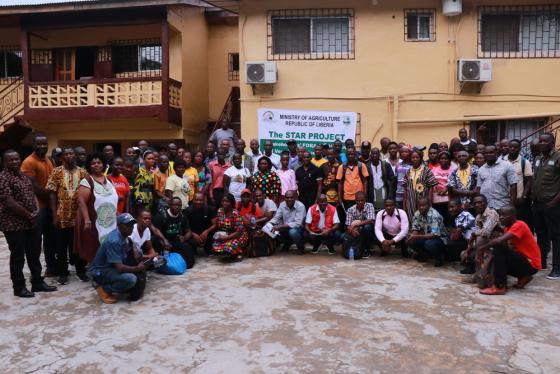Liberia: Vegetables, Oil Palm Producers Agree on Climate Smart Agriculture, Technologies as Way Forward

A two day forum aimed at discussing ways in which producers and sellers of vegetables, oil palm, and palm products can collaborate with the Ministry of Agriculture to improve their productivity has ended in Kakata, Margibi County.
The forum took place on October 18 and 19, 2022, and brought together more than 200 participants from across Liberia who are involved with the two value chains. Climate smart agriculture that includes best practices and the use of new technologies was decided as the way forward.
It was organized by the Ministry of Agriculture (MoA), through its Smallholder Agriculture Transformation Revitalization and Agribusiness Project (STAR-P), which is funded by the World Bank and IFAD, and seeks to develop the rice, oil palm, and vegetable value chains to demonstrate commercial viability.
During the forum, the Operations Manager of the STAR project, Stephen Marvie, said that over the next few years, farmers and other members of the vegetable and oil palm value chains are expected to benefit greatly from the project. He named the provision of matching grants, agronomic training in the three value chains and market creation, among other things, as benefits lined up for the 38,000 beneficiaries that are targeted under the project.
Mr. Steven Marvie, Operation Manager of STAR-P, speaks to the participants.
“This forum is convened to inform you about the opportunities that exist at the ministry for smallholder farmers like yourselves, and how you can benefit from them. This is also to provide you with the opportunity to obtain basic knowledge on various important topics that relate to your farming ventures, and together we can agree on the best way to improve the work we do,” he said.
According to him, the project has launched a grant program that ensures finance for beneficiaries to improve productivity.
The Star Project Manager disclosed that the project is working to boost the production of the various value chains with the use of new and improved technologies.
“For our vegetable value chain, we are working to develop what we consider kitchen gardens. We are exploring all the possibilities of improving vegetable production in Liberia. We are making sure farmers can access better seeds and coaching and ensuring that more farmers are knowledgeable about the right use of inputs,” he said.
The two-day forum educated the participants on several topics, including strengthening agribusiness in the vegetable and oil palm value chains, business development and compliance requirements, the importance of cooperatives, new agronomic practices in oil palm and vegetables, among others.
Participants of the forum thanked the Ministry of Agriculture for holding the engagement forum that provided a platform for the exchange of ideas and dialogue.
Sumo Mulbah, head of the Vegetable Traders Association, said that they welcome the project’s intervention for the improvement of the vegetable sector. He also said that the vegetable sector is confronted with a lot of challenges, and it is their hope that the project would help bring about a change in the sector. “Vegetables are a profitable venture, but mass production and marketing are still challenges faced by members of our organization. We would like to work with the Ministry to make sure that smallholder farmers in the sector are empowered to increase the supply of the crops that they produce," the vegetable traders' association head stated.
Mr. Franklin Jackson, Executive Director of the Liberia Oil Palm Sector, said his association has incorporated all oil palm farmers and is working to bring other members of the value chain on board.
He said the association is working to make sure that farmers produce quality products from the crops that will be supplied to markets that are already available. “The sector is now attracting investors to improve market access and the production of improved seedlings. We are happy about the introduction of the project to address some of our challenges,” Jackson mentioned.
Members of the Liberia Vegetable Sellers Association (LVSA) and producers, the National Oil Palm Platform of Liberia (NOPPOL) and the Liberia Oil Palm Sector were also drilled through the process of developing business plans that could qualify for matching grants under the MOA/STAR-P scheme that is managed by the Liberia Agriculture Commercialization Fund (LACF).
